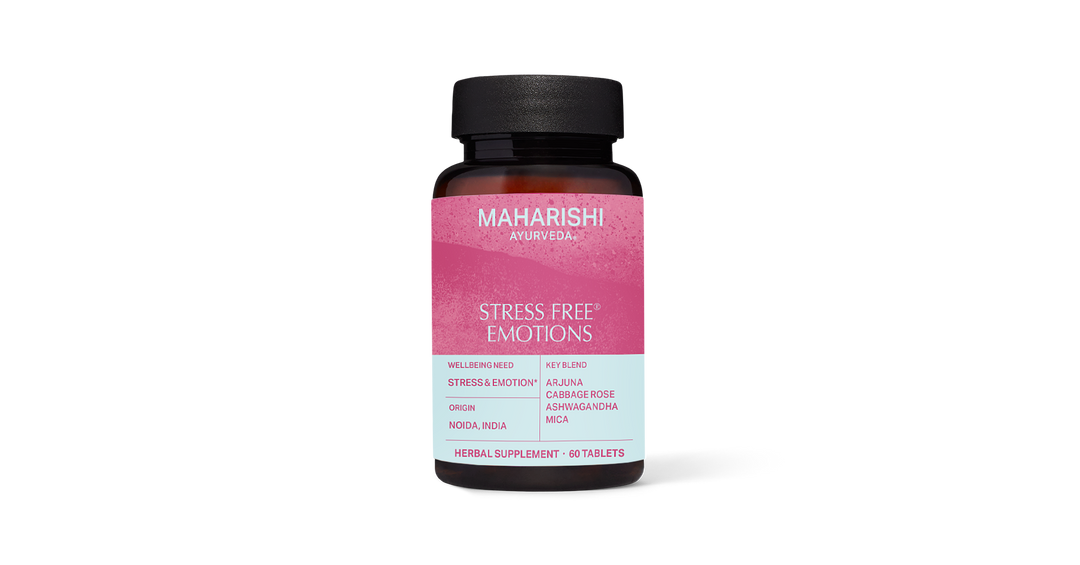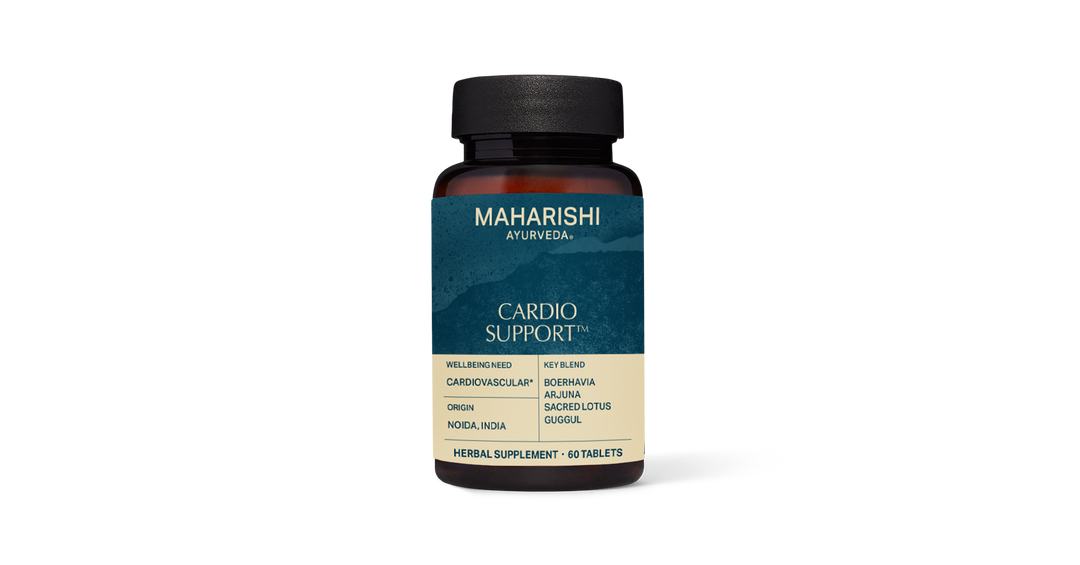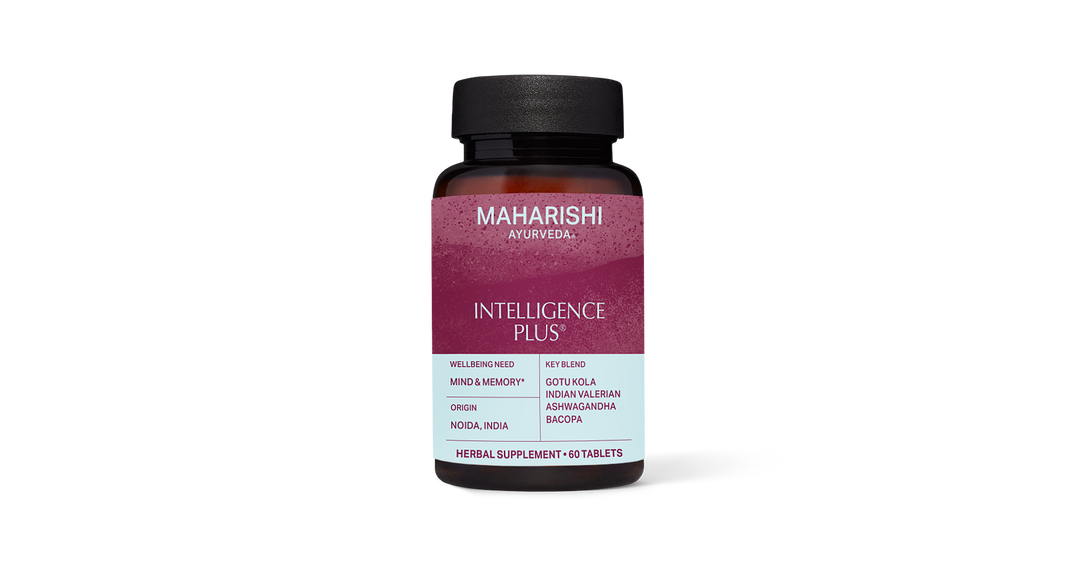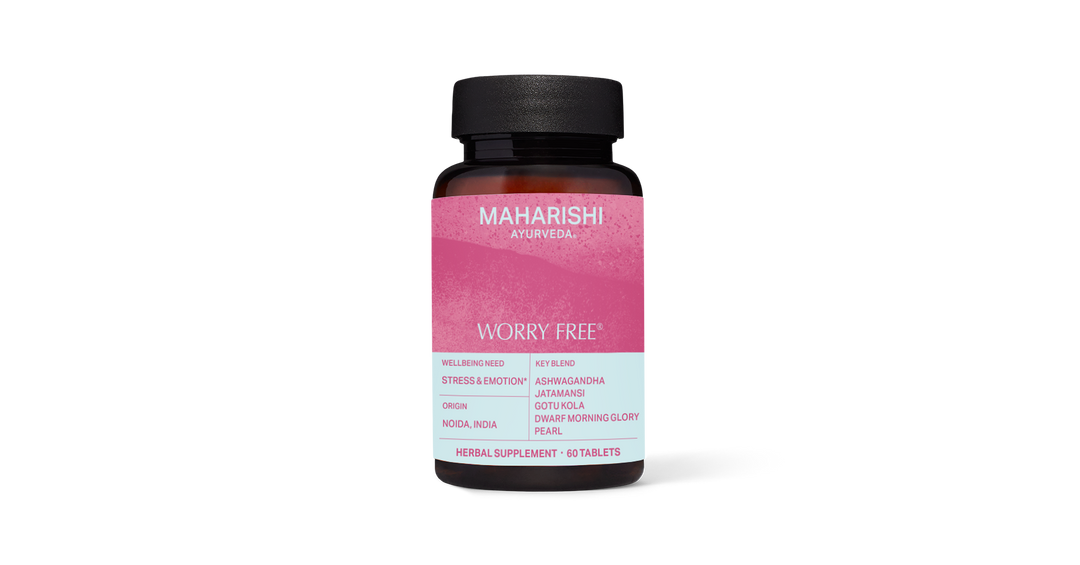Ayurveda is a 5,000-year-old system of natural medicine from India. According to the ancient Ayurvedic texts, one of the eight major branches of Ayurveda is Mental Health.
Starting in the early 1980’s, Maharishi Mahesh Yogi, the Vedic scholar who made Transcendental Meditation® available worldwide and founded Maharishi AyurVeda, met with Ayurvedic scholars, doctors and scientists for the purpose of restoring this ancient system of medicine to its full dignity.
Meditation, as well as diet, exercise, herbal formulas and other healthy lifestyle habits are profoundly effective for reducing stress, while increasing health and happiness.
The Transcendental Meditation technique reduces stress: The source of many imbalances
Stress is now known, through modern research, to be one of the main root causes of many mental health issues. In addition to stress, poor diet, lack of exercise, unhealthy habits (like drug and alcohol use and many other addictive behaviors), and lack of sufficient rest are additional risk factors for the development (or exacerbation) of mental health issues.
Modern healthcare systems lack effective methodologies for reducing stress and finding ways to motivate patients to improve their diet, get more exercise and rest, and to reduce unhealthy habits. Because unhealthy habits are often attempts to cope with stress, stress reduction often calls for the ability to make healthier life choices.
Transcendental Meditation® is a highly regarded and recommended technique of Maharishi AyurVeda, as we share the same founder. During the practice of TM, the mind effortlessly settles to a state of deep silence, or pure consciousness.
Transcending provides rest deeper than sleep
Because of the intimate connection between mind and body, when our mind transcends the field of activity, our body becomes very relaxed. Modern research demonstrates that during this deep level of rest our metabolic rate drops to levels much deeper than is typically seen during sleep. It is this profound level of rest to both the mind and body that enables deep-rooted stress and fatigue to be released.
For this reason, TM, along with the other Ayurvedic practices, greatly enhances the self-repair mechanisms of the mind-body system. Scientific research indicates that this self-repair even occurs at the level of our DNA, and this may explain the holistic benefits in the area of mental health that are seen in those who embrace the practices of Maharishi AyurVeda. As such, Maharishi AyurVeda addresses many of the root causes of mental health issues that have their basis in stress.
Modern psychiatry addresses the mental, behavioral, and biochemical levels of individual imbalance, providing a mechanism to address imbalance. However, from the perspective of Maharishi AyurVeda, to be a truly healthy individual one must also regularly experience the deep silence found at the source of thought, by “transcending” thought.
Modern treatments do not have a systematic technique for experiencing this subtle and essential state of awareness, and as such may be limited in their ability to achieve their goals. The deepest level of our consciousness — known as pure consciousness in the ancient texts known as the vedas — which is regularly experienced during the practice of TM, is a state of restful alertness. This unique state, when regularly experienced, enables the self-repair mechanisms of our body to function most efficiently.
In addition to TM, there are a number of other Ayurvedic recommendations that have been shown to be beneficial to our mental health. They include diet and exercise tailored to one’s psychophysiological type, purification processes, herbal formulas for the mind and emotions, suggestions for quality sleep, daily routine recommendations, and developing skills for ideal relationships.
Other Ayurvedic practices compliment meditation
Eat according to your mind-body type
Historically Ayurveda has considered an unhealthy diet and poor digestion to be potential causes of emotional imbalance. This is because, when our food is not properly and efficiently digested, unwanted metabolic by-products of digestion (called ama) are produced.
There are primarily three kinds of ama: Vata ama, Pitta ama, and Kapha ama. Vata ama can cause nervousness and occasional anxiety; Pitta ama can cause irritability; and Kapha ama can cause low ambition and sadness. Both our psychophysiological type (Vata, Pitta, or Kapha), and the type of food we are eating, determine which type of ama is produced.
Modern medicine is recognizing more and more the “brain-gut connection.” When our gut is healthy — when we eat according to our body type and when we eat the proper amount of food at the proper time — this directly affects our emotional state. Our gut is second only to our brain for nerves and as such is a direct source of emotional reference for our bodies.
A consultation with an Ayurvedic Practitioner can help us design an “ama-reducing” diet best suited to our unique constitution. Other factors that produce ama may include how fast we eat, how well we chew our food, how stressful our lifestyle may be, when we eat our meals — especially our main meal of the day — and the quantity of food we consume.
Exercise according to your mind-body type
Exercise, according to Ayurveda, is considered vital to mental health. Modern medical research has begun to substantiate this ancient prescription. Exercise increases serotonin and endorphins, neurotransmitters that are well known to improve mood.
In addition, exercise reduces chemicals in the bloodstream that can cause inflammation throughout the body, including in the brain. Inflammation is being discovered to be one of the potential causes of a variety of mental health issues. However, the degree of exercise that is recommended is dependent upon our psychophysiological type as well. Too little or too much exercise can be harmful, so it’s useful to know whether we are Vata, Pitta, or Kapha predominant.
Vata types feel their best emotionally with mild-to-moderate exercise, such as walking or light jogging. If Vata types over-exercise, it can increase anxious feelings.
Pitta types feel best with a moderate amount of exercise. Swimming is ideal for Pittas because it tends to keep them from overheating, which in turn can increase irritability.
Kapha types feel happiest when they get a greater degree of aerobic exercise. Otherwise they can feel apathetic and sad. In addition, practicing certain yoga postures has been found to increase circulation to the brain, and to produce hormones that are beneficial to mental health.
Ayurveda recommends a daily Hatha yoga routine that serves to enhance our mental health. Along with yoga, breathing exercises, called pranayama, are helpful in particular for reducing stress and worry. The practice of yoga, together with pranayama, is also beneficial as a preparation for a deeper experience during meditation.
Ayurvedic herbal formulas support mental health
Some of the world’s most renowned quantum field theorists in physics have postulated that our thoughts and emotions are wave functions, a vibratory phenomenon. The Maharishi AyurVeda herbal preparations work on many levels of our physiology, such as the biochemical level. But they are also described as working with our thoughts and emotions.
In Ayurveda, when we state that a particular herb or combination of herbs target a particular organ or physiological function, physics views this in a parallel manner. Physics would state that each plant ingredient in the traditional Maharishi AyurVeda formulas is known to have a specific frequency, or wave pattern, which, when ingested, resonates with specific parts of the body that have a similar wave frequency. Hence, the Maharishi AyurVeda herbals work at a very deep and subtle level. Many studies have shown that certain Ayurvedic herbal preparations can be helpful to improve mood and cognition.
Maharishi Ayurveda herbals such as Stress Free Emotions, Worry Free, Blissful Joy, Cardio Support, Mind Plus, Intelligence Plus, and Stress Free Mind are a few examples of herbal combinations that can help to promote balance in mental and emotional functioning.
Ayurvedic detox treatments benefit mental and emotional health
Also called Panchakarma in Ayurveda, this has been shown to be very beneficial to mental and emotional functioning. Some of the treatments used in Panchakarma are oil massage (Abhyanga), Shirodhara (oil poured over the forehead), and basti (herbalized enemas).
The combination of these and other purification therapies work to systematically remove toxins from the cellular level of the body. The result of these gentle detoxification procedures is improved mood and mental clarity, amongst many other benefits. Ayurveda recommends doing body purification for three to five days once or twice per year. The Raj in Fairfield, Iowa, along with other Maharishi Ayurveda clinics in the U.S. and around the world, offers these treatments.
Try the Ayurvedic daily routine for better sleep and digestion
The importance of a healthy daily routine for optimal mental health cannot be overemphasized. It’s well established in medical literature that not getting enough sleep can increase feelings of sadness and occasional anxiety, and impair cognition and mental focus.
According to Ayurveda, getting to sleep by 10:00 p.m. is ideal, as that’s the time when Kapha dosha dominates and we are most likely to be naturally sleepy. That’s when melatonin levels are highest for most of us. Melatonin is produced by the pineal gland and induces sleep. The herbal formula Blissful Sleep can be helpful to promote improved sleep.
In terms of the timing of meals, eating three times a day with the main meal at noon (when our digestive fire is strongest), with supper being light and not too late, is ideal. A regular meditation practice and daily exercise are also recommended for optimal mental well-being. Some regular socialization with loving, supportive friends at least a few times a week has also been found to promote longevity and improved mental health.
Self-care supports healthy relationships
Ayurveda recognizes that the quality of our close relationships greatly impacts our mental health. Most of us experience that on days when there is conflict in our intimate relationships, we feel emotionally unsettled, as compared to feeling more happy and peaceful on days when there is a feeling of closeness and harmony.
Learning skills to effectively communicate and work through the disharmony when it arises is vital to our mental peace and happiness. In addition to learning healthy relationship skills, it is helpful to follow all the above recommendations in order to first be emotionally balanced within ourselves. When we feel content within ourselves, our joy overflows and it’s natural to want to give to our loved ones. When a glass is partly full, the water doesn’t go anywhere. When the glass is full, the water overflows.
The approaches of Maharishi AyurVeda—Transcendental Meditation and other lifestyle practices—have been found to have a profound effect on improving our mental health and well-being. Explore more solutions at the Stress & Emotions Wellness Hub.
_____
Jim Brooks, MD, has spent his life helping people create health for themselves through natural medicine. He is a practicing psychiatrist who has studied and applied Maharishi AyurVeda for many years. He received extensive training from some of the most renowned Vaidyas (Ayurvedic physicians) in India. He is also a teacher of the Transcendental Meditation technique and has authored many journal articles and book chapters on Ayurveda and mental health.
© 1999, 2021 Maharishi AyurVeda Products International, Inc. (MAPI). All Rights Reserved. MAPI does not provide medical advice, diagnosis or treatment. These statements have not been evaluated by the Food and Drug Administration. Products are not intended to diagnose, treat, cure or prevent any disease. See additional information.








